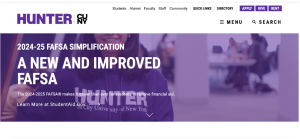 Screens across Hunter showcase information about the FAFSA’s update and available filing workshops. (Photo by Laila Gad)
Screens across Hunter showcase information about the FAFSA’s update and available filing workshops. (Photo by Laila Gad)
A line trails out of the financial aid office, filled with students anxiously waiting to speak with a counselor about their tuition balances barring them from class registration. For almost half of CUNY students coming from households earning less than $20,000, this reality is all too familiar.
And, it’s only going to get more stressful with the Department of Education’s announcement on Jan. 30 that all colleges will receive students’ Free Application for Federal Student Aid FAFSA information in mid-March, otherwise known as the FAFSA. As a result, colleges expect to release their financial aid decisions by mid-April, with most commitment dates falling on May 1.
The delays are caused by the transition to the new application form developed following the FAFSA Simplification Act passed by Congress in 2020. The new application form promised a streamlined application process with fewer questions, increased eligibility, and the ability to send information to more than 10 colleges as previously allowed.
This isn’t the first delay experienced by students in this new process. With all the changes, the form was made live to students on Dec. 30, a three-month delay. The form is usually accessible by October.
While other college systems, like the State University of New York (SUNY), have communicated with their students about the situation, Hunter has been quiet on the situation.
Fazrin Jahan, a senior at Hunter College majoring in biology, finds this especially troubling.
“As a student that is reliant on federal aid, I am unsure why Hunter hasn’t said anything yet on what they will do about the delay with receiving my FAFSA,” she said. “It already takes a long time to hear back from the financial aid office.”
The official website for CUNY’s Financial Aid Office does not offer any clarity. One sentence from the page reads: “The U.S. Department of Education recently announced that institutions will not receive 2024-2025 FAFSA applicant information until mid-March, which will delay CUNY’s ability to provide students and their families with a timely financial aid offer.”
Yet, with some searching, resources are available for students on the Hunter website. Rather than a lack of announcements, the issue may lie with the fact that communications are not broadly shared with students – unless they are looking for it.
Following suit with the SUNYs, CUNY announced on February 23rd that the commitment deadline would be pushed back a month to June 1st to accommodate the fact that almost 75% of CUNY undergraduates receive financial aid.
Many higher education analysts say that the delays mean that students can’t completely commit to their education, specifically those who identify as BIPOC and come from low-income backgrounds.
For colleges like Hunter, where almost 60% of its student body receives Federal Pell Grants, this news is especially troubling.

Hunter has information posted for students about the new FAFSA on their website.
However, there is some hope for students. Interim Admissions Director Joseph Fantozzi shared some insight on updated resources available for students, which include virtual and in-person financial aid workshops, an updated Navigate financial aid reminder system, and an expansion of the financial aid office to lighten the caseload.
While students are waiting, they should do three things, Director Fantozzi said. Attend one of the financial aid workshops, ask questions to the financial aid office, and use the net price calculator to estimate the cost of attendance.
The next financial aid workshop is Wednesday, March 13 at 1:00-3:00pm via Zoom. The Zoom information can be found here.
While Hunter students and administrators both await further announcements, filing your FAFSA early is the best bet students have to receive their financial aid package as soon as possible.
